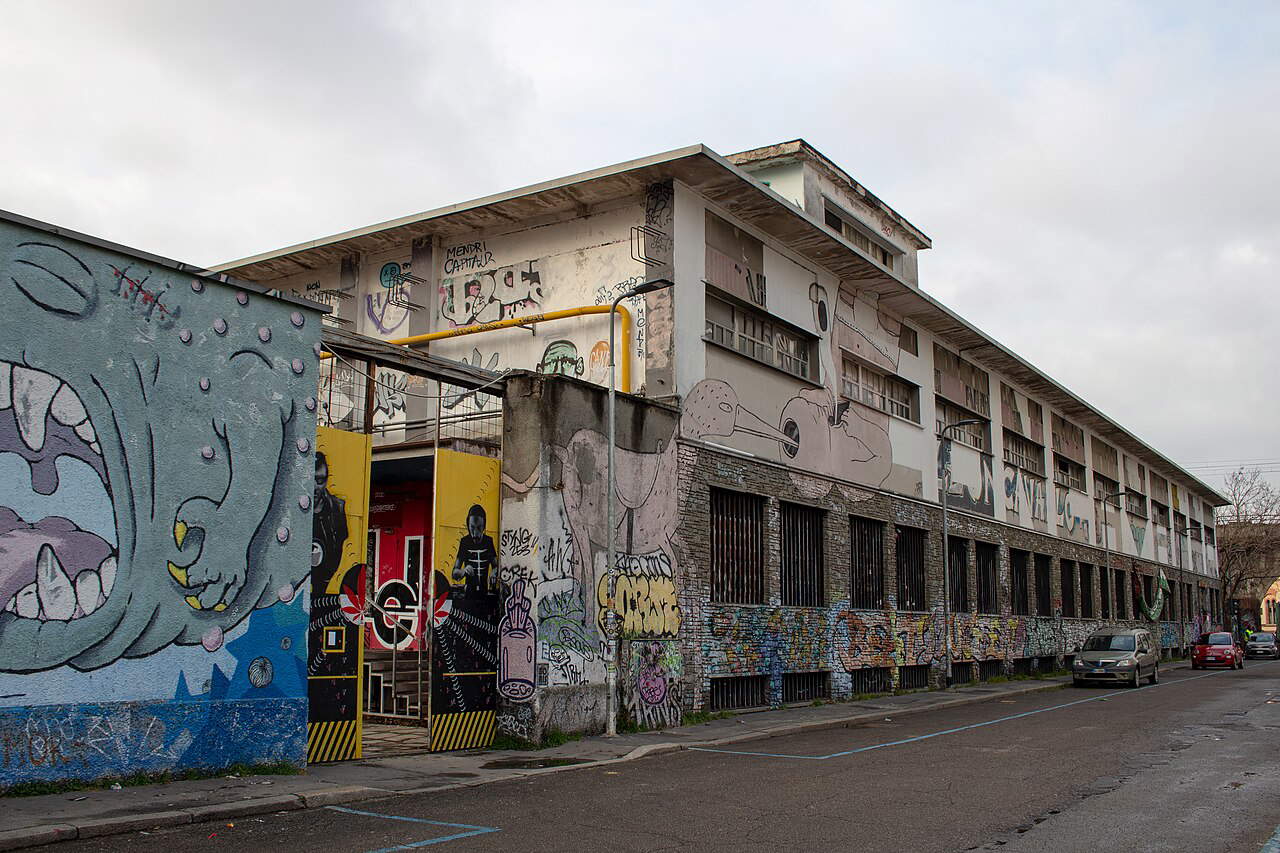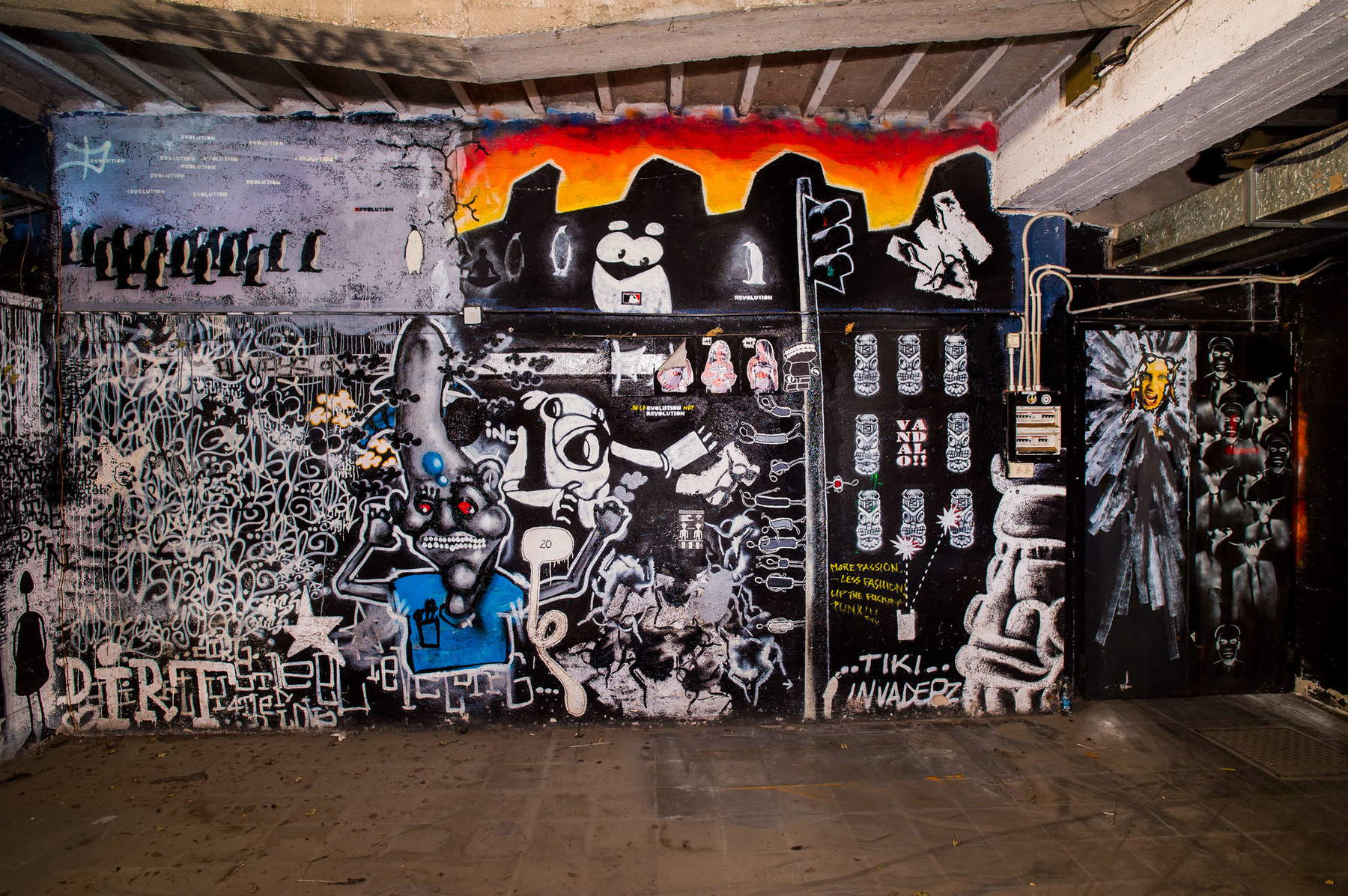In a blitz in the morning, the historic Leoncavallo social center, which had been founded in 1975 and had by then become one of the most famous social centers in Italy, if not the best known ever, was evicted in Milan . Since 1994 it had occupied the structure from which it was evicted, on Via Watteau, after being based for nineteen years on Via Ruggero Leoncavallo, the street from which it takes its name, and for a brief period in a building on Via Salomone. A nerve center of Milanese counterculture, the Leoncavallo since its founding has been an important reference point, having promoted various cultural, musical and social initiatives. The vacated building, a space of about 4.000 square meters, is owned by the Cabassi family, which the first years did not ask to vacate the building: began asking to repossess it in 1999, there were negotiations between the social center and the owners but the situation remained unchanged until this morning, when, at around 8 a.m., about 130 carabinieri and an even more substantial number of police officers accompanied the bailiff and the lawyer from “L’Orologio” real estate, the Cabassi family company that owns the area, to execute the eviction order issued against the social center.
No one was present inside the premises. It was a raid two weeks in advance, because the eviction had been served for Sept. 9, and coming after as many as 133 unsuccessful eviction attempts. Last November, the Ministry of the Interior had also been ordered in the Court of Appeals to pay the sum of 3 million euros to the Orologio real estate company because of its failure to evict. And the ministry had decided to retaliate against the “Mamme del Leoncavallo” association, which in turn had submitted an expression of interest to the municipality for a space on Via San Dionigi in view of a possible move from the Via Watteau location. According to leaks in the Milanese press, the eviction comes after pressure from Fratelli d’Italia on Interior Minister Matteo Piantedosi, according to whom “the eviction marks the end of a long season of illegality. For 30 years that property has been squatted.” Council Speaker Giorgia Meloni also exults: “In a rule of law, there can be no free zones or areas removed from legality,” she declares on social media. “Squatting is a detriment to security, to citizens and to communities that respect the rules. The government will continue to ensure that the law is respected, always and everywhere: it is the essential condition to defend the rights of all.”
According to the Milan City Council, in a note sent by Mayor Giuseppe Sala, the city administration had not been notified. “Yesterday I was at Palazzo Marino, busy with business meetings,” the first citizen said. “I delegated the deputy commander of the Local Police on my behalf to attend the Committee for Order and Security that, as is customary, is held every Wednesday. There was no mention at that meeting of any executive eviction of the Leoncavallo social center. For such a sensitive operation, beyond the committee, there were many ways to alert the Milan administration. Those ways were not pursued. I received the news from the Prefect this morning. The intervention on the Leoncavallo was yes scheduled, but for September 9. In view of this official timeline, as a municipality we had continued, with the leaders of Leoncavallo, a discussion that would bring the whole initiative of the center to full legality. As pointed out by some newspapers, various solutions in accordance with the law were being considered, which could go in the desired direction. I am convinced, and I have stated this before, that Leoncavallo holds historical and social value in our city. In my opinion, this social center must continue to emit culture, clearly in a context of legality. It has been a peaceful place of engagement for years and years. I confirm my willingness to keep an open interlocution with those responsible for the activities of the social center.”


Political reactions are to the contrary. League secretary Matteo Salvini expresses satisfaction: “decades of illegality tolerated, and repeatedly supported, by the left: now we finally change. The law is the same for everyone: afuera!” Along the same lines, city councilor Alessandro De Chirico of Forza Italia: “It is a day of celebration for the neighborhood of Greco finally liberated, but also for Milan and the entire country for the triumph of legality. It took 50 years but better late than never. Now no shortcuts must be allowed for the social center. If their representatives want a new headquarters, let them look for it in the free market and pay the rent.” From the left, everyone is pointing out the double standards for Casa Pound ’s failure to evict it from its illegally occupied Roman headquarters. This is pointed out, for example, by Francesca Cucchiara, councilwoman for Europa Verde: “The surprise eviction, without any notice, is a cowardly and cowardly gesture,” she says. “They knew very well that on September 9 they would find many people in the garrison, because they know perfectly well how Leoncavallo is a place dear to so many. And so they thought to snatch it away surreptitiously. That Salvini now talks about legality makes one smile: as if people had forgotten that at Leoncavallo he used to go there too. As if people did not know that, in the meantime, CasaPound has been squatting in a building in the center of Rome for years, with no one announcing or promising eviction. Because the real problem for the right in this country is not illegality, but the existence of spaces for political dissent.” Of the same opinion is Alessandro Capelli, Milan secretary of the PD: “Leoncavallo has been an important part of Milan’s history, representing for many generations an open space of socialization and culture.” In his view, Piantedosi and Salvini are “the ministers of legality on alternate plates: distracted when CasaPound remains serenely in place in Rome.” Pierfrancesco Majorino, a Pd regional councilor and longtime alderman in Milan, also intervened. “In the middle of August, not giving a damn about the confrontation that had been going on for a long time and the attempts to reach a positive solution on which many were committed, among them the very exponents of Leoncavallo, here they are clearing out the social center. A place that had become over time an important laboratory of cultural and social initiatives. A reality that to consider an issue of public order is absolutely foolish and instrumental. A choice, that of Minister Piantedosi, serious, immediately hailed by that vulture Salvini.”
Not everyone knows that on the building on Via Watteau there is also a constraint from the Superintendence of Milan. In May 2023, in fact, Palazzo Litta had recognized the historical, artistic and cultural value of the graffiti, created by various urban artists, present in the DaunTaun space at the Leoncavallo headquarters (in the basement of the building), which represent one of the most complex and long-lived layers of street art in Italy. Much of this graffiti dates back to 2003, when the first public street art event in Italy was held at the Leoncavallo during the ninth and final International Happening of Underground Art (HIU), an entirely managed and self-produced event.
In 2021, the graffiti was restored. “The preservation of these works is, today, fundamental as a testimony and memory of the context and practices on the birth of street art as we know it now,” the social center declared at the time. “To preserve them is not to crystallize the beginning, but to decode an artistic practice born in the spontaneity of the claim on the social use of urban spaces, that revolutionary freedom that can only belong to art and culture. The absolute genuineness of the events that led to the present artistic heritage, preserved almost in its entirety in its artistic and environmental organicity, makes it unique once again and forever public, because the voice of the ’city below’ belongs to everyone’s history.” Thus, two years ago, the superintendence decided to protect DaunTaun’s graffiti ope legis under the combined provisions of Articles 11 and 50 of Legislative Decree No. 42/2004 - Cultural Heritage and Landscape Code. The body thus recognized the significance of a set of street art works considered in their context: it was hailed as a landmark decision.
It is unclear what will happen now with the eviction: what is certain is that, since the graffiti is a work under superintendence constraint, the owners who have returned to possession of the building will have to ensure its preservation as prescribed by the Cultural Heritage Code, which, in Article 50, prohibits the detachment of frescoes, coats of arms, graffiti, tombstones, inscriptions and tabernacles, whether or not they are exposed to public view, without the permission of the superintendence. Graffiti, therefore, will have to remain where it is, unless the protection agency decides otherwise.
The protection came as a result of a process that lasted several years and started in 2020 when the General Directorate of Creativity of the Ministry of Culture entrusted INWARD - National Observatory on Urban Cre ativity with a scientific investigation centered precisely on urban creativity. INWARD, with its director Luca Borriello, immediately carried out an initial survey of DaunTaun’s spaces, and as a result of that initial reconnaissance it was decided on maintenance work supervised by restorers Alessandra Carrieri and Marco Teatro. INWARD therefore prepared a dossier that was followed by a study day on November 11, 2022, entitled “Urban Art, What Possible Protection. Issues of permanence-transition, spontaneity and public commissioning,” organized by the Milan Superintendency.
Instead, it dates back to April 17, 2023, when the superintendency sent officials Roberta Sara Gnagnetti and Alice Cosmai to the Leoncavallo, who carried out their inspection together with Leoncavallo exponents Marco Teatro and Luca Borriello, as well as Anita Pirovano, president of Milan City Council’s Municipality 9, and Simone Locatelli, president of Municipality 2. The following month, the letter from Superintendent Emanuela Carpani giving notice of the protection: "With reference to the hope expressed verbally during the inspection by the representatives of the Leoncavallo Social Center, that the wall paintings preserved in the basement rooms will be subject to state protection, this Superintendency recalls that the wall paintings result subject to protection ope legis, pursuant to the combined provisions of Art. 11 and 50 of Legislative Decree 42/2004 Code of Cultural Heritage and Landscape: they not only cannot be defaced or damaged, but also cannot be detached, and by extension destroyed, without the permission of the Superintendence."
 |
| Milan, evicted the Leoncavallo: inside are also graffiti protected by the Soprintendenza |
Warning: the translation into English of the original Italian article was created using automatic tools. We undertake to review all articles, but we do not guarantee the total absence of inaccuracies in the translation due to the program. You can find the original by clicking on the ITA button. If you find any mistake,please contact us.